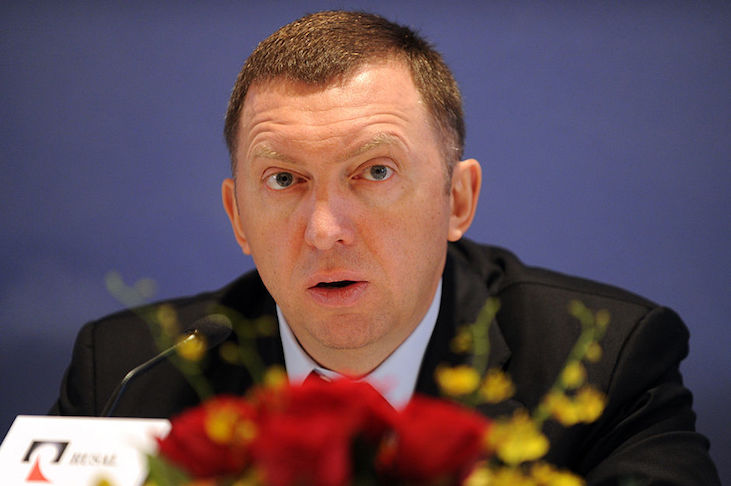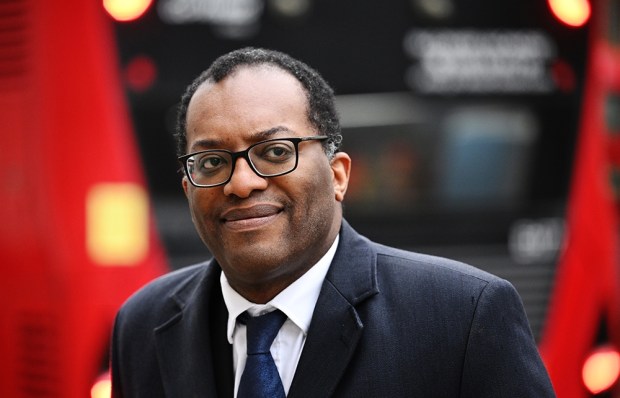In connection with the receding possibility of a London Stock Exchange listing for Saudi Aramco, I wrote that the City authorities’ apparent eagerness to accommodate companies ‘from places not best known for their accounting standards, business probity or general attachment to democracy and the rule of law’ smacked of Brexit-driven desperation. Russia was one of the places I had in mind. Now along comes a listing candidate that rings more alarm bells than the secretive Saudi oil giant.
The company concerned is called EN+ Group, and it is the first Russian entity to come to the London market since Russia’s aggression in Ukraine and Crimea provoked US and EU sanctions in 2014. EN+’s business is ‘energy and aluminium’; its controlling shareholder is Oleg Deripaska, the Russian billionaire often described as a member of Vladimir Putin’s inner circle and best known in the UK for entertaining George Osborne and Peter Mandelson on his yacht in Corfu in 2008. More topically, Deripaska has a well-documented history of dealings with Paul Manafort, the former Trump campaign chief who has been indicted for money laundering.
Gossip aside, EN+ is clearly a big business, with revenues of $5.8 billion in the first half of this year; and even if its published numbers so far are no more than ‘highlights’, we can expect advisers and listing officials to do the necessary due diligence. Likewise in reassuringly old-fashioned style, EN+ has a lord on the board in the person of its recently appointed chairman, the former climate change minister Lord (Greg) Barker. Its $1.5 billion flotation will generate fees for blue-chip banks such as Citigroup, Credit Suisse, J.P. Morgan and Merrill Lynch, and will tie in a major Chinese investor, AnAn Group, of the sort that the City is also keen to attract. So why be sniffy about a deal which reaffirms London’s pre-eminence in global capital markets?
Well, some might say that the City shouldn’t be doing business with anyone so close to Putin’s Kremlin; but such fastidiousness broadly applied to unsavoury regimes might rule out trading with half the emerging world, which isn’t where we want to be as Brexit approaches. More specifically, EN+ says it intends to use the ‘primary proceeds’ of the share offering ‘to repay a portion of its debt’ — which is owed largely to Russian banks such as VTB (also an EN+ shareholder) that helped bail out Deripaska’s businesses with Kremlin support after the 2008 crash, and are currently subject to US and EU sanctions. So London investors’ money will be flowing back into Putin’s other-wise ostracised banking system.
Deripaska himself was rather scathing about London’s continuing financial clout after he chose to list his aluminium company Rusal (now controlled by EN+) in Hong Kong in 2010. Perhaps today he thinks the City is turning into a soft touch.
Gordon’s revelation
I can’t wait to read Gordon Brown’s My Life, Our Times, in which I gather he vents his spleen at bankers’ delusional risk-taking before and during the 2008 crash and offers, as evidence of their madness, the revelation that Barclays contemplated taking over the shipwrecked RBS at the height of the crisis. If true, that’s a fascinating nugget, though there may have been many such ideas tossed around in the heat of the moment. But it didn’t happen and — however furious Brown may be that Barclays slipped out of his bailout net by means of a Middle Eastern capital-raising that belatedly led to criminal charges — the one acquisition Barclays did pull off at the time, of the rump of Lehman Bros, was an opportunist triumph. By contrast, the one merger Brown himself was instrumental in forging, between Lloyds and HBOS, was an outright disaster. I wonder if there’s a chapter headed ‘Mea Culpa’?
Tiptoeing towards normality
There are occasions when an apparently negative economic indicator is also in some sense positive. September’s 9 per cent drop in new car registrations compared with the same month last year was no bad thing if it means fewer people are loading themselves up with debt to buy cars — and won’t hurt British car factories that are part of a global supply chain. Likewise, falling London house prices may carry a negative message about international confidence in the UK, but will help London workers to buy homes. And a quarter-point interest rate rise, if it has finally arrived, may look like a sign of concern at the Bank of England and a worry for mortgage borrowers, but is actually a tiptoe back towards the economic normality we have almost forgotten.
Bon appétit, encore
I was in France again last week, so you’ll expect me, comme d’habitude, to drop the name of a good restaurant. Tackling a pig’s trotter at Brasserie Lipp on the Boulevard Saint-Germain, I sensed a buzz. Not of tourists — the only English words on the menu warn ignorant Americans not to order salad as a main course — but of Parisian businessmen and their mistresses (so I surmised) tucking in lustily, warmed by the thought that their economy is on the up again.
Positive signals from manufacturing, construction and the job market are contributing to growth expectations of 1.7 per cent this year, up from 1.2 per cent in 2016 and slightly better than the current OECD forecast for the UK. After a sticky start, President Emmanuel Macron has embarked on promised reforms of labour law and wealth taxes. Of course, you might argue, his programme hasn’t had time to make a real difference yet; France still has 3.7 million unemployed and decades of underperformance to put right. So the new optimism is partly no more than relief at the departure of Macron’s dismal predecessor, François Hollande. But it also demonstrates the energising effect of a fresh-faced pro-business political leader with a clear plan that starts with tax cuts. Would that we had one here.
Got something to add? Join the discussion and comment below.
Get 10 issues for just $10
Subscribe to The Spectator Australia today for the next 10 magazine issues, plus full online access, for just $10.
You might disagree with half of it, but you’ll enjoy reading all of it. Try your first month for free, then just $2 a week for the remainder of your first year.















Comments
Don't miss out
Join the conversation with other Spectator Australia readers. Subscribe to leave a comment.
SUBSCRIBEAlready a subscriber? Log in